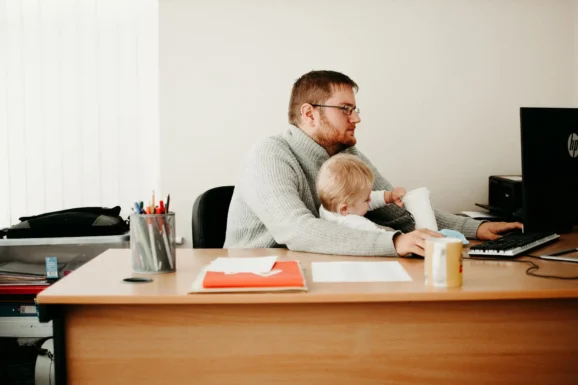Stop the boardroom entering the living room

John E. Kaye
- Published
- Opinion & Analysis, Science

Even the best leaders can still unconsciously bring work home in ways that risk impacting their children’s mental and emotional development, writes Professor Michael Atar
There’s a moment many parents in senior leadership will recognise: walking through the front door after a long day, only to find yourself still in ‘work mode’, issuing instructions, correcting errors and monitoring for inefficiencies.
While there’s much to be said for introducing children to sound business principles and structure, when it comes from unconscious habit rather than conscious intent, it can impact their development in ways that could hinder rather than help them in their adult lives.
Children are not employees and they are not here to perform. As a psychoanalytic psychotherapist, I’ve seen how easily this shift happens, and how quietly its effects unfold. It enters the home in subtle ways, through the language we use, the tone in which we speak, and the expectations we convey.
The occasional slip isn’t really a problem but when it happens repeatedly, the family begins to echo the workplace and we can see children, who are sponges of emotion and behaviour, beginning to adopt roles not unlike those seen in the workplace.
There is, for instance, the child who adopts the role of the office high-achiever. They subconsciously come to seek praise for getting things right and for being responsible, not so much beyond their pay grade but beyond their years. This translates into them being the first to volunteer for household chores and the one who seeks to excel at school.
This might sound like music to every parent’s ears, but when a child’s self-worth becomes entangled with performance, the flipside is that they develop a fear of letting someone down. And that fear, over time, can be corrosive. The child begins to equate love and safety with success. They become anxious about making mistakes, reluctant to speak openly about their feelings and exhausted from always trying to get it ‘right’.
Then there is the joker, who just like their office counterpart uses humour to avoid tension. In effect, they become the family’s entertainer, always ready with a joke, a funny face or a silly voice.
But their laughter often masks a deeper sensitivity. When conflict arises, they may clown to distract. When something serious is happening, they become the comic relief. Adults may praise them for their ‘good attitude’, never realising that comedy has become their emotional shield.
Another role children can assume is that of the fixer, the one who, in a system of stress or emotional volatility, quietly takes on the role of harmoniser. This is often the eldest child, or the one most attuned to adult feelings. They sense when their parent is upset, even if nothing is said. They step in to help with younger siblings, soothe arguments or try to make themselves useful at every turn.
Their reward is approval but the price is emotional exhaustion. They become anxious when others are upset, not because they’re fragile but because they’ve learned it’s their job to hold everyone together.
Then there’s the rebel. This child is often misunderstood. Seen as difficult, disruptive or oppositional, they are in fact the one most likely to be expressing what others are suppressing. If the culture avoids vulnerability, be it in the workplace or home, the rebel shouts it out. If perfection is demanded, they refuse to comply. Their behaviour is rarely random but instead a conscious protest expressing that something isn’t right. But without the emotional insight of an adult, they risk being cast as the problem rather than the messenger. If this happens often, the child internalises the message that their feelings are unwelcome and that their instincts are wrong. They also come to associate speaking up with conflict — which in time, can result in emotional suppression, low self-worth, or a deep-seated discomfort with trust and intimacy.
Lastly, there is the invisible one, the child who, like certain employees, makes no fuss, causes no conflict and quietly slips under the radar. They are easy to parent because they rarely ask for anything, but this low profile is not to be confused with contentment. Disappearing emotionally, they keep their thoughts to themselves, building an inner world where things may feel safer, but much lonelier.

Photo: Lisa/Pexels
So how do we prevent these roles from becoming fixed patterns and how do we, as parents, begin to lead differently at home?
The first step is awareness. It’s not about perfection or policing every sentence we say, which is unrealistic, but about noticing when we’ve slipped into managerial mode and gently stepping back.
That might mean creating a simple transition ritual between work and home: a walk, a change of clothes, a moment of stillness — anything that allows us to decompress before re-entering the family space.
Equally important is adjusting the way we speak. We must remember that our child is not our business partner, and we should not be speaking to a five-year-old or a teenager in the same way we would with a trusted colleague or spouse. Sharing too much information — especially about money, family pressures or confidential matters — may feel like healthy openness but it can place a burden on the child that they are not yet equipped to carry. Children cannot hold context in the way adults do. They hear the tension but not the nuance.
We must also remember that a child is nurtured and emotionally held by parents who offer them time, freedom and emotional safety. Providing resources or guidance without these essentials is like offering a beautifully wrapped gift with nothing inside: it may look impressive from the outside, but it lacks the substance children truly need to thrive.
Children don’t want to know how many holidays you can afford or what lucrative business ventures you’re planning next. They want to know if they’ll have the freedom to study what they love, to explore hobbies that excite them and to grow up without feeling burdened by your expectations.
In the end, the goal is not to eliminate structure or discourage productivity. There are many lessons we can learn from the boardroom that can be brought home to help children to succeed later in life.
But we must lead with purpose and presence rather than a blind drive for perfection. When we listen more than we instruct, we create a home in which our children are free to grow not into roles but into themselves.

Professor Michael Atar is a psychoanalytic psychotherapist with a background in medicine and over 25 years’ experience as a paediatric dentist. A father to a large family, he works with parents, carers, families, and children of all ages, offering a warm, collaborative and non-judgemental space. His work includes support for postnatal depression, PTSD, and developmental concerns such as feeding, sleep, and bonding difficulties. He also supports individuals and couples before, during and after pregnancy. Professor Atar is a full member of the UKCP.
Main photo: Jep Gambardella/Pexels
RECENT ARTICLES
-
 WPSL targets £16m-plus in global sponsorship drive with five-year SGI partnership
WPSL targets £16m-plus in global sponsorship drive with five-year SGI partnership -
 Dubai office values reportedly double to AED 13.1bn amid supply shortfall
Dubai office values reportedly double to AED 13.1bn amid supply shortfall -
 €60m Lisbon golf-resort scheme tests depth of Portugal’s upper-tier housing demand
€60m Lisbon golf-resort scheme tests depth of Portugal’s upper-tier housing demand -
 2026 Winter Olympics close in Verona as Norway dominates medal table
2026 Winter Olympics close in Verona as Norway dominates medal table -
 Europe’s leading defence powers launch joint drone and autonomous systems programme
Europe’s leading defence powers launch joint drone and autonomous systems programme -
 Euro-zone business activity accelerates as manufacturing returns to expansion
Euro-zone business activity accelerates as manufacturing returns to expansion -
 Deepfake celebrity ads drive new wave of investment scams
Deepfake celebrity ads drive new wave of investment scams -
 WATCH: Red Bull pilot lands plane on moving freight train in aviation first
WATCH: Red Bull pilot lands plane on moving freight train in aviation first -
 Europe eyes Australia-style social media crackdown for children
Europe eyes Australia-style social media crackdown for children -
 These European hotels have just been named Five-Star in Forbes Travel Guide’s 2026 awards
These European hotels have just been named Five-Star in Forbes Travel Guide’s 2026 awards -
 McDonald’s Valentine’s ‘McNugget Caviar’ giveaway sells out within minutes
McDonald’s Valentine’s ‘McNugget Caviar’ giveaway sells out within minutes -
 Europe opens NanoIC pilot line to design the computer chips of the 2030s
Europe opens NanoIC pilot line to design the computer chips of the 2030s -
 Zanzibar’s tourism boom ‘exposes new investment opportunities beyond hotels’
Zanzibar’s tourism boom ‘exposes new investment opportunities beyond hotels’ -
 Gen Z set to make up 34% of global workforce by 2034, new report says
Gen Z set to make up 34% of global workforce by 2034, new report says -
 The ideas and discoveries reshaping our future: Science Matters Volume 3, out now
The ideas and discoveries reshaping our future: Science Matters Volume 3, out now -
 Lasers finally unlock mystery of Charles Darwin’s specimen jars
Lasers finally unlock mystery of Charles Darwin’s specimen jars -
 Strong ESG records help firms take R&D global, study finds
Strong ESG records help firms take R&D global, study finds -
 European Commission issues new cancer prevention guidance as EU records 2.7m cases in a year
European Commission issues new cancer prevention guidance as EU records 2.7m cases in a year -
 Artemis II set to carry astronauts around the Moon for first time in 50 years
Artemis II set to carry astronauts around the Moon for first time in 50 years -
 Meet the AI-powered robot that can sort, load and run your laundry on its own
Meet the AI-powered robot that can sort, load and run your laundry on its own -
 Wingsuit skydivers blast through world’s tallest hotel at 124mph in Dubai stunt
Wingsuit skydivers blast through world’s tallest hotel at 124mph in Dubai stunt -
 Centrum Air to launch first European route with Tashkent–Frankfurt flights
Centrum Air to launch first European route with Tashkent–Frankfurt flights -
 UK organisations still falling short on GDPR compliance, benchmark report finds
UK organisations still falling short on GDPR compliance, benchmark report finds -
 Stanley Johnson appears on Ugandan national television during visit highlighting wildlife and conservation ties
Stanley Johnson appears on Ugandan national television during visit highlighting wildlife and conservation ties -
 Anniversary marks first civilian voyage to Antarctica 60 years ago
Anniversary marks first civilian voyage to Antarctica 60 years ago



























